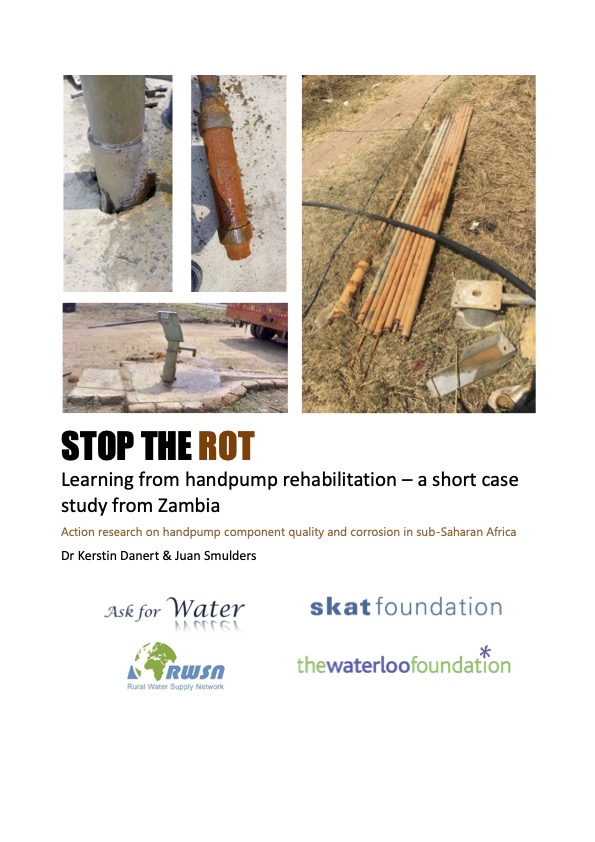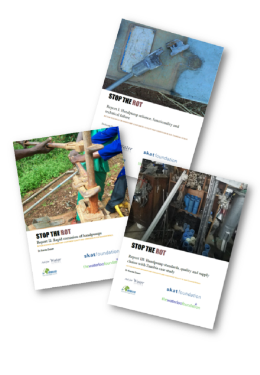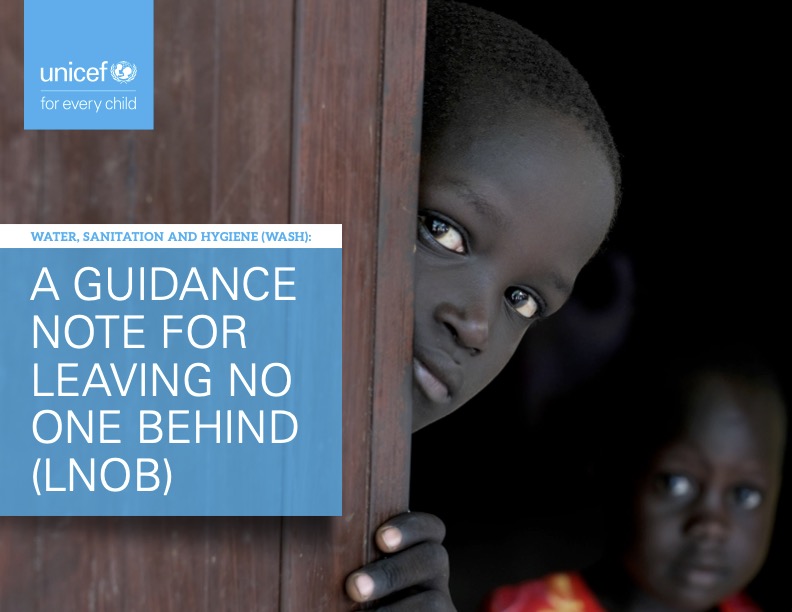Projects are listed below – grouped according to the type of services provided: (i) Facilitation and Knowledge Management, (ii) Research, Studies and Publications and (iii) Education and Training. You can also find out more in the blog posts.
Facilitation and Knowledge Management
Theme lead on Professional Water Well Drilling for the Rural Water Supply Network (RWSN) (ongoing)
This work strives to ensure that groundwater resources are properly considered and sustainably used for developing drinking water supply sources and ensuring their long-term quality and security. The theme is embedded within the Rural Water Supply Network (RWSN). Activities include managing webinars entitled: Exploring the relevance of Borehole Drilling Associations in English and French, sharing resources, responding to queries and managing RWSN’s Professional Water Well Drilling Webpage. The full ‘late-2020’ RWSN webinar series, including all presentations is available here.
Improving the use of climate change information for adaptation in Uganda (2022)
Planning, oversight and online facilitation of a hybrid face-to-face /online workshop on improving the use of climate change information for adaption in Uganda for the British Geological Survey (BGS) and Ministry of Water and Environment, Uganda.
Knowledge Management for the Walker Institute at the University of Reading (2020)
The Walker Institute at the University of Reading, UK is an Interdisciplinary Research Centre that supports a Climate Resilient Society. The institute works with communities and organisations, particularly in Africa, to support evidence-based action that sustains both livelihoods and the environment. From June to December 2020, Ask for Water GmbH provided knowledge management services to the institute, including structuring, streamlining and quality assuring communications activities. This included co-producing a short film on the work of the Institute in the Sahel region, which is part of an inspiring programme called Adapting for Tomorrow’s Environment by CIWEM, produced by ASN Media.
Unlocking Africa’s Groundwater Potential – a short film to inform and inspire (2020)
Kerstin Danert led the production of a short film about the potential of groundwater in Africa for the UPGro programme with the researchers of several projects. The context and key findings of an interdisciplinary research programme between 2013 and 2020, funded by the UK government, on groundwater in Africa are presented in an engaging, 10-minute video that combines animation with recorded footage. Click here for the referenced film script.
The collaboration was with academics from five European academic institutions – University of Oxford, University of Reading, the British Geological Survey (BGS), University College London (UCL) and UNESCO-IHE as well as representatives from partner organisations and the film company, Room3. The main film is here; and the series of shorter films are here.
Research, Studies and Publications
Stop the Rot: History of the Rapid Corrosion Problem in Zambia and Potential Next Steps (2023)
This report presents the history and geographic extent of the rapid handpump corrosion phenomenon in Zambia. It describes the fragmented and seemingly forgotten solutions that have taken place since the 1980s. The report charts when and where the phenomenon became evident in the country, the measures taken (or not), and what was learned (or not), and proposes next steps for the Zambian government and its cooperating partners to tackle this pervasive problem. Download full report here.
Stop the Rot: Learning from handpump rehabilitation – case study from Zambia (2022)
Short report which presents data on the community perceptions and physical defects of 24 handpumps surveyed, reflects on how rehabilitation programmes could be reported on in the future, and makes some recommendations for a future study, as well as for handpump installation and rehabilitation in Zambia.
The report is intended to stimulate further reflection by governments, as well as the organisations that fund and implement handpump rehabilitation projects in Zambia and beyond.

Assessment of the Simple, Market-based, Affordable and Repairable Technologies (SMART) approach for Water and Sanitation (2022)
Assessment of the potential of the “Simple, Market-based, Affordable and Repairable Technologies (SMART) approach to contribute to Sustainable Development Goal DG 6 – ‘ensure availability and sustainable management of water and sanitation for all’, and related SDGs in eight African countries (Ethiopia, Kenya, Ghana, Malawi, Niger, South Sudan, Tanzania and Zambia). Review of documents, analysis of primary data collected in Tanzania and Zambia including water point surveys and focus group discussions and water quality testing and key informant interviews.
Stop the rot: handpump functionality, corrosion, component quality and supply chains
(2021 -2022)
This Rural Water Supply Network (RWSN) initiative led by by Skat Foundation and Ask for Water GmbH strives to find ways in which key stakeholders can ensure that handpump technologies and spare parts that are installed for drinking water in sub-Saharan Africa are consistently of high quality and can last.
The ‘Stop the Rot’ trilogy document the scale and extent of rapid handpump corrosion and the use of poor-quality handpump components in sub-Saharan Africa and tries to bring about actions to address these problems. These two interlinked issues contribute to poor handpump performance, rapid handpump failure and poor water quality, all of which can ultimately lead to abandonment of the handpump sources, thus forcing users to return to contaminated or distant water supplies.
The first report estimates the reliance on handpumps in sub-Saharan Africa, reviews the literature on handpump functionality and performance, and synthesises information on handpump technical quality from various studies and assessments. The second report examines handpump corrosion in detail, with an overview of what is known and what has been done to address the issue in specific SSA countries and by select organisations. The third report reflects on the existing guidance on handpump quality assurance, collates examples of poor-quality components, and examines handpump supply chains through a case study of Zambia.

Achievements and Lessons Learned in the Implementation of Groundwater Regulation in Zambia / Réalisations et enseignements tirés de la mise en œuvre de la réglementation des eaux souterraines en Zambie (2022)
This publication provides a brief overview of Zambia’s country context including water resources and water use. It summaries the National Water Policy, 2010 and Water Resources Management (WRM) Act, 2011 before describing what the three new Statutory InstrumentsIs (SIs) specifically set out to regulate. The publication examines compliance with and enforcement of the regulations and the regulatory outcomes to date. Reflections by the authors and recommendations are summarised, as is a synopsis of key lessons learned.
Sensor Data for Sustainable Water Services in Humanitarian Contexts: South Sudan (2021)
The project aims to increase the proportion of the time that handpump boreholes provide a water supply service (the ‘uptime’). Satellite-linked and cellular phone-linked sensors are being introduced on handpumps in order to enhance information flows for those who are in a position to respond to either imminent or actual pump breakdowns. The project is a partnership between Tearfund Netherlands and UK, CEDS and Richard Carter and Associates.
Water, Sanitation and Hygiene: Leaving No One Behind – a guidance note for UNICEF and partners (2020 – 2021)
This Guidance Note explains what Leaving No One Behind (LNOB) means and sets out how UNICEF and its partners can integrate it fully into their WASH programming. It describes ways of identifying who is being left behind, where they are, and ways of engaging with them. It also provides information on how to analyse and address their needs. The guidance comprises three parts:
- Part I explains the LNOB imperative, providing key definitions.
- Part II emphasises the fact that it is people that are at the centre of LNOB, using examples.
- Part III provides entry points and examples of actions for LNOB for UNICEF WASH programming.
The publication was developed by Kerstin Danert.

Monitoring Groundwater Use as a Domestic Water Source by Urban Households: Analysis of Data from Lagos State, Nigeria and Sub-Saharan Africa with Implications for Policy and Practice (2021)
The fundamental importance of groundwater for urban drinking water supplies in sub-Saharan Africa is increasingly recognised. However, little is known about the trends in urban groundwater development by individual households and its role in securing safely-managed drinking water supplies. Anecdotal evidence indicates a thriving self-supply movement to exploit groundwater in some urban sub-Saharan African settings, but empirical evidence, or analysis of the benefits and drawbacks, remains sparse. Through a detailed analysis of official datasets for Lagos State, Nigeria we examine the crucial role played by groundwater and, specifically, by household self-supply for domestic water provision. Joint publication with Dr Adrian Healy.
Striving for Borehole Drilling Professionalism in Africa: A Review of a 16-Year Initiative through the Rural Water Supply Network from 2004 to 2020 – a published paper (2020)
Despite its strategic importance, the practical realities of borehole drilling provision in Africa, including driller skills, siting, supervision, drilling standards, drilling procurement and contract management, drilling professionalism and drilling regulation have been neglected by academic research. This paper charts the story, outcomes and impact of efforts by the Rural Water Supply Network (RWSN) on drilling professionalism and manual drilling for 16 years. At a total cost of about USD 750,000, the profile of drilling professionalism and manual drilling have been raised, providing materials and inspiring action. Thousands of stakeholders have improved their knowledge but the issue remains marginal for national and international political leadership. Kerstin Danert led this work from 2005, as an independent consultant in Uganda, with Skat Foundation and then from Ask for Water GmbH. Visit RWSN’s Professional Drilling and Manual Drilling web pages to access materials online. Co-authored with Dotun Adekile and Jose Gesti Canuto.
RWSN Publication: A Turning Point for Manual Drilling in the Democratic Republic of Congo (2020)
Co-author of a publication that documents over a decade of pioneering efforts by UNICEF, the Government of the Democratic Republic of Congo and partners to introduce and professionalise manual drilling. Over a ten-year period, manual drilling, using the rota-jetting technique, has gone from a little-known technology in the DRC to an effective technology that has enabled about 650,000 people to be provided with a water service. This publication is available from the RWSN website in English and French. Co-authored with Cheikh Hamidou Kane.
Education and Training
Online learning on groundwater – strengthening capacity in African member states and beyond (2021 – 2022)
Partnership with the Africa Groundwater Network, Cap-Net UNDP and others to develop and run two online courses on groundwater. The courses strengthened the capacity of the staff of governments, NGOs, the private sector and academia in African member states and beyond. You can access the 2022 Professional Drilling Management course report, manual and key training materials here. The Groundwater Resources Management course report, manual and materials are available here.
If you would like to learn about what alumni of previous online courses on Professional Drilling Management have done with their knowledge, check out the short film below or the short report of their testimonials.
